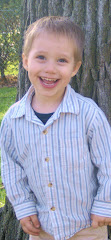It is so true. At birth, the child's brain has the ability to learn any and all languages of the world - no matter how complicated - easily and without effort. He will learn as many as are presented to him. The possibilities are, literally, limitless.
The problem is that we have all too often ignore this incredible ability. If, say, between the ages of 20 and 25, a person's brain was prepped for unlimited language-learning and could learn as many languages as he was exposed to, would we not call him a fool if he didn't seize those precious years to learning as many languages as possible? If such were the case, we would advise all young men and women: "Make the most of those precious years because knowing as many foreign language as possible is beneficial for the rest of your life! And after all, the brain grows by use! Seize the moment!"
Of course, between the ages of 20 and 25 are not prime years for learning language. But such a stage does exist, and it exists in the first six years of life. However, the difference is that toddlers and not going to set out to study the world's languages. In this case especially, "The fate of a child is in the hands of his parents." (Shinichi Suzuki)
In this information age, it is now easier than ever to learn a foreign language. I am not necessarily proposing that you sign your one-year-old up for French class or higher a Japanese tutor. However, parents can and should make it a priority to give their child a second or third language with all means possible.
I have, in the past few months, been debating what languages to teach Hunter. I know a fair amount of Spanish and have been teaching him bits and pieces here and there, and would like to become more fluent so he can really learn the language. My dad speaks some German. My sister is practically fluent in Dutch. I know some sign language as well, and I always thought it would be fun to learn Braille and Morse Code.
The options go on. I would like him to learn some Latin and Greek as they are classic languages from which English originated, and I always thought it was cool learning Greek and Latin roots in grammar class ("photo" means light and "graph" means drawing so "photograph" is a drawing from light!) I would also very much like him to learn Hebrew as it is the language much of the Bible was written in.
French, Japanese, and Chinese are highly-spoken languages that I have a lot of available resources to gleam from. There is a lot of stuff at the library that can be utilized. It sounds like a lot, but when I consider that the tools to learn them are sitting right in front of my face, all I can think is "Why not?"
 His potential is without bounds. Why limit him? He literally has the ability to learn absolutely anything that I present him with effortlessly and with lightening speed. If I have the resources to give him Chinese, then bygone I'm going to give him Chinese.
His potential is without bounds. Why limit him? He literally has the ability to learn absolutely anything that I present him with effortlessly and with lightening speed. If I have the resources to give him Chinese, then bygone I'm going to give him Chinese.Let's just say that, should it not be for Doman I would have never even CONSIDERED taking up all these languages. Before Doman I never really realized how quickly and easily little kids could learn. Now that I do, all I want to do is give him the world.
I'm not going to be thoroughly covering all these languages. But, I figure, if he knows say, 200 common words in each of these languages, plus a hundred common phrases, and maybe whatever songs or conversations we have available from library resources, wouldn't that just be neat? And then with this base of language, when he is a little or a lot older, he can take it as far as he wants and learn more and become fluent in as many languages as he chooses? I just want to give him a thorough springboard from which he can do whatever he chooses.
Learning a 300-500 word vocabulary from twenty or more languages sound like a crazy and time-consuming thing to ask, but with Doman, it really would take very little time to come about that reality. The Doman How to Give Your Baby Encyclopedic Knowledge "Language" category is simple: create a Bit (a large card with a picture [fact] on it) and on the back write the word in ten different languages. So, for a "parts of the body" set you could have a picture of hand, arm, foot, head, etc. and write that word in ten different languages on the back of each of the ten cards. You teach one language at a time, so for example doing parts of the body and teach them all in Spanish, then in French, etc. It would take a total of about two minutes to teach each language, which would be a total of about twenty minutes to teach a set of ten objects in ten different languages. And he will remember it for the rest of his life. Cool, huh?
It's not useless information: it's fun, it's useful, and the brain grows by use. I always thought it would be fun to know a basic vocabulary from many different languages, but never had the time or the motivation to study them. Now I do. And isn't this going to be a great deal of fun?
Today I got some tapes from the library. They are kids tapes called "Teach Me German", etc. and I got them in all the available languages: German, Spanish, French, and Japanese. Why not? They're tapes, we listen to them, sing along, eventually learn them, and he knows some more information about languages. When I got home I was motivated to dig into the language resources we have in our home library. I got out some Latin, sign language, Greek, Spanish, French, and German kids stuff we have. I also remembered that that Baby Einstein "Language Nursery" movie has a flashcards section on special features. I didn't really like the movie, since it just does random nursery rhymes and counting and such in different languages but what's going on on the screen has nothing to do with what they're saying. However, the flashcards section has the alphabet in English, Spanish, French, German, Italian, Hebrew, Japanese, and Russian. It also has some other flashcards in these languages.
So, I'm having fun playing with languages and teaching my boy. It's really not a great deal of extra effort to, say, check out books on tape in Spanish from the library, or listen to songs in German, or read "Can You Count Ten Toes? Count to Ten In Ten Different Languages" at bedtime. Language learning has simply become a fun part of our play and exploration of the world. And I'm glad to give Hunter this opportunity, and am excited about learning at least some of it myself.
"And there was given him dominion, and glory, and a kingdom, that all people, nations, and languages, should serve him: his dominion is an everlasting dominion, which shall not pass away, and his kingdom that which shall not be destroyed."Daniel 7:14

.jpg)
1 comment:
I have a question though - can you pronouce the languages enough to use the bits? I want to teach my son in the same manner, but realized that I can't say the words! I hate to have to rely on the computer and dvds, but maybe after awhile I'll pick up on how to say the words.
Post a Comment